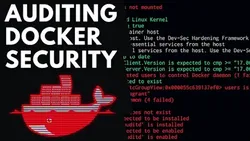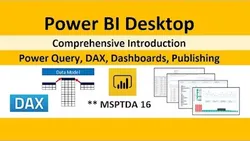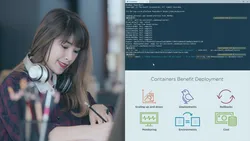
Auditing Docker Security 
This course provides an introduction to auditing Docker security. It covers understanding the Docker platform, the differences between containers and hypervisors, Docker architecture, what needs to be secured, and auditing tools. A practical demonstration is also included. ▼
ADVERTISEMENT
Course Feature
![]() Cost:
Cost:
Free
![]() Provider:
Provider:
Youtube
![]() Certificate:
Certificate:
Paid Certification
![]() Language:
Language:
English
![]() Start Date:
Start Date:
On-Demand
Course Overview
❗The content presented here is sourced directly from Youtube platform. For comprehensive course details, including enrollment information, simply click on the 'Go to class' link on our website.
Updated in [February 21st, 2023]
Introduction.
What we will be covering.
Understanding the Docker platform .
Containers Vs Hypervisors.
Docker Architecture.
What needs to be secured?.
Auditing Tools.
Practical Demonstration.
(Please note that we obtained the following content based on information that users may want to know, such as skills, applicable scenarios, future development, etc., combined with AI tools, and have been manually reviewed)
1.You can gain a comprehensive understanding of the Docker platform, including its architecture, components, and security needs.
2.You can learn the differences between containers and hypervisors, and how to use auditing tools to secure Docker containers.
3.You can gain practical experience in auditing Docker security through demonstrations and hands-on exercises.
4.You can learn how to identify and mitigate potential security risks associated with Docker containers.
5.You can gain an understanding of the best practices for securing Docker containers and the tools available to help you do so.
[Applications]
After completing this course, participants should be able to apply the knowledge gained to audit the security of Docker containers. They should be able to identify potential security risks and vulnerabilities, and be able to use the auditing tools to assess the security of their Docker environment. Additionally, they should be able to develop strategies to mitigate any security risks and vulnerabilities that are identified.
[Career Paths]
1. Docker Security Engineer: A Docker Security Engineer is responsible for ensuring the security of Docker containers and the underlying infrastructure. They must be knowledgeable in the Docker platform and its architecture, as well as the security best practices for containerized applications. They must also be able to identify and mitigate potential security risks and vulnerabilities.
2. DevOps Engineer: DevOps Engineers are responsible for the development, deployment, and maintenance of applications and services in a Docker environment. They must be knowledgeable in the Docker platform and its architecture, as well as the security best practices for containerized applications. They must also be able to identify and mitigate potential security risks and vulnerabilities.
3. Cloud Security Architect: Cloud Security Architects are responsible for designing and implementing secure cloud architectures for Docker-based applications and services. They must be knowledgeable in the Docker platform and its architecture, as well as the security best practices for containerized applications. They must also be able to identify and mitigate potential security risks and vulnerabilities.
4. Security Analyst: Security Analysts are responsible for monitoring and analyzing security threats and vulnerabilities in a Docker environment. They must be knowledgeable in the Docker platform and its architecture, as well as the security best practices for containerized applications. They must also be able to identify and mitigate potential security risks and vulnerabilities.
The demand for these positions is increasing as organizations move to containerized applications and services. As the technology continues to evolve, these positions will become even more important as organizations look to ensure the security of their applications and services.
[Education Paths]
1. Bachelor of Science in Computer Science: This degree path focuses on the fundamentals of computer science, such as programming, software engineering, and computer architecture. It also covers topics such as artificial intelligence, machine learning, and data science. This degree path is becoming increasingly popular as technology advances and more organizations rely on computer systems to run their operations.
2. Bachelor of Science in Cybersecurity: This degree path focuses on the security of computer systems and networks. It covers topics such as cryptography, network security, and digital forensics. This degree path is becoming increasingly important as organizations become more reliant on digital systems and need to protect their data from malicious actors.
3. Master of Science in Information Security: This degree path focuses on the security of information systems and networks. It covers topics such as risk management, security architecture, and security operations. This degree path is becoming increasingly important as organizations become more reliant on digital systems and need to protect their data from malicious actors.
4. Master of Science in Cybersecurity: This degree path focuses on the security of computer systems and networks. It covers topics such as cryptography, network security, and digital forensics. This degree path is becoming increasingly important as organizations become more reliant on digital systems and need to protect their data from malicious actors. It also covers topics such as auditing Docker security, which is becoming increasingly important as organizations move to container-based architectures.
Course Provider

Provider Youtube's Stats at AZClass
Discussion and Reviews
0.0 (Based on 0 reviews)
Explore Similar Online Courses

Webinar: Get Started with Wix Wix ADI

MSPTDA 16: Power BI Desktop Comprehensive Introduction: Power Query DAX Dashboards Publishing

Python for Informatics: Exploring Information

Social Network Analysis

Introduction to Systematic Review and Meta-Analysis

The Analytics Edge

DCO042 - Python For Informatics

Causal Diagrams: Draw Your Assumptions Before Your Conclusions

Whole genome sequencing of bacterial genomes - tools and applications

Managing Docker on Linux Servers

Fundamentals of Docker and Kubernetes for NET Developers


Start your review of Auditing Docker Security